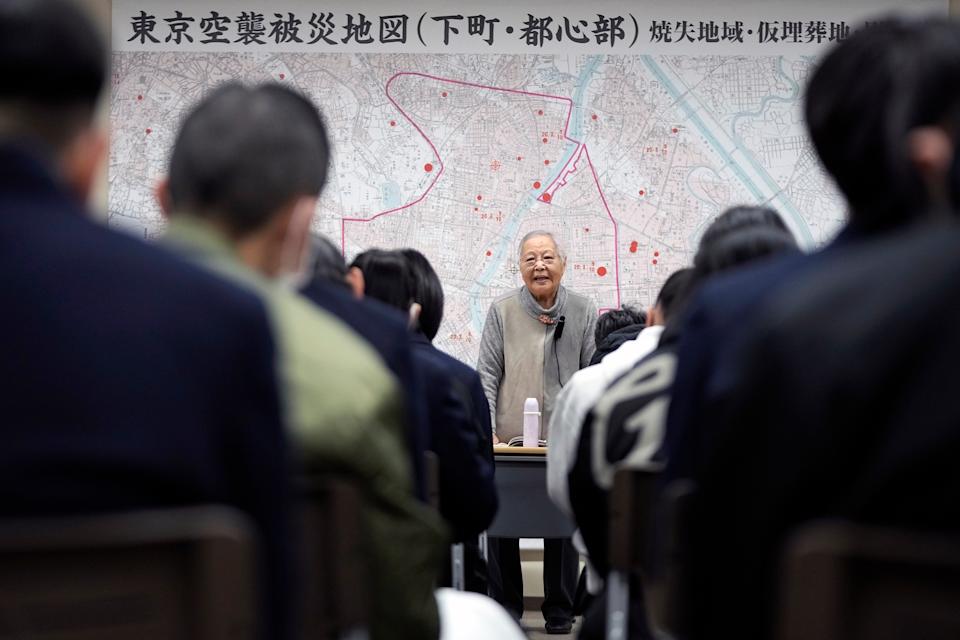Imagine walking through the streets of Tokyo on a fateful night, the sky glowing an eerie red as the air fills with the sounds of sirens and screams. This was the reality for many on March 10, 1945, when a devastating firebombing raid left the city in ruins. Now, 80 years later, survivors are sharing their stories and demanding recognition and compensation for their suffering. Their voices, echoing through the decades, remind us of the human cost of war and the importance of peace.
The Night That Changed Everything
On the night of March 10, 1945, the United States launched a massive firebombing raid on Tokyo. Hundreds of B-29 bombers dropped cluster bombs filled with napalm, designed to ignite the traditional wood and paper homes in the densely populated downtown areas. The result was catastrophic.
A Survivor’s Story: Shizuyo Takeuchi
Shizuyo Takeuchi was just 14 years old when her world was turned upside down. Her family had already lost their home in an earlier bombing, and they were staying with relatives when the raid began. Her father’s quick thinking saved them, as he led the family across the river in the opposite direction of the fleeing crowds.
Takeuchi remembers walking through the night under a sky that seemed to be on fire. The next morning, she witnessed a scene that would haunt her forever: two charred bodies, one a woman and the other her baby. The sight of so many dead and dying left her numb.
“I was terribly shocked. I felt sorry for them,” she recalls. “But after seeing so many others, I was emotionless in the end.”
The Scale of the Tragedy
More than 105,000 people are estimated to have died in the Tokyo firebombing, with a million others left homeless. The death toll surpassed that of the atomic bombing of Nagasaki just months later. Yet, the Tokyo raid has been largely overshadowed by the atomic bombings, and the firebombings of other Japanese cities have received even less attention.
The raid came after the collapse of Japanese air and naval defenses, as the U.S. captured key Pacific strongholds that allowed bombers to reach Japan’s main islands. Frustration with the length of the war and past Japanese military atrocities fueled the intensity of the attack.
Preserving the Memory
The Legacy of Katsumoto Saotome
Ai Saotome is on a mission to preserve the memory of the Tokyo firebombing. Her father, Katsumoto Saotome, was a survivor and an award-winning writer who dedicated his life to documenting the experiences of his peers. When he passed away in 2022 at the age of 90, he left behind a house full of notes, photos, and other materials.
Ai is now digitizing these records at the Center of the Tokyo Raids and War Damage, a museum her father founded in 2002. “Our generation doesn’t know much about their experience, but at least we can hear their stories and record their voices,” she says. “That’s the responsibility of our generation.”
She believes that these documents will be crucial in the coming years, as the number of living survivors dwindles. “In about 10 years, when we have a world where nobody remembers anything about this, I hope these documents and records can help,” she adds.
The Fight for Compensation
Despite the scale of the tragedy, civilian victims of the U.S. firebombings have received no compensation from the Japanese government. In contrast, military veterans and atomic bomb survivors have been provided with substantial support.
A group of survivors recently met to renew their demands for recognition and financial help. They are seeking 11 million yen (about $74,300) each, but Japanese courts have rejected their claims, stating that citizens are expected to endure suffering during wartime.
In 2020, a group of lawmakers proposed a one-time payment of half a million yen (about $3,380), but the plan has stalled due to opposition from some ruling party members.
“This year will be our last chance,” said Yumi Yoshida, who lost her parents and sister in the bombing, referring to the 80th anniversary of Japan’s WWII defeat.
The Human Cost of War
A Nurse’s Harrowing Experience
Reiko Muto, a former nurse, was on duty when the sirens began to wail on March 10, 1945. She rushed to the pediatric department, carrying infants down a dimly lit stairwell to a basement gym for shelter. Soon, truckloads of people arrived, many with severe burns, crying and begging for water.
Muto remembers the screaming and the smell of burned skin, which stayed with her long after the war ended. “Comforting them was the best I could do because of the shortage of medical supplies,” she says.
When the war finally ended on August 15, 1945, Muto’s first thought was that she could leave the lights on without fear of another bombing. She went on to complete her studies and worked as a nurse, helping children and teenagers. “What we went through should never be repeated,” she emphasizes.
The Importance of Remembering
The stories of the Tokyo firebombing survivors are a stark reminder of the human cost of war. Their experiences, though often overlooked, are crucial to understanding the true impact of conflict on civilians.
As the number of living survivors continues to decline, it becomes increasingly important to preserve their stories and ensure that their suffering is not forgotten. The work of individuals like Ai Saotome and the ongoing efforts of survivors to seek recognition and compensation are vital steps in this process.
The Tokyo firebombing was a turning point in World War II, and its legacy continues to shape the lives of those who lived through it. By listening to their stories and supporting their calls for justice, we can honor their resilience and work towards a future where such tragedies are never repeated.
Looking Forward
As we approach the 80th anniversary of the end of World War II, it is crucial to reflect on the lessons learned from the Tokyo firebombing. The survivors’ demand for compensation is not just about financial support; it is about acknowledging their suffering and ensuring that future generations understand the true cost of war.
Their stories are a powerful reminder of the need for peace and the importance of preserving history. By keeping their voices alive, we can work towards a world where such devastation is never repeated.
The echoes of that fateful night in Tokyo continue to resonate, reminding us of the human spirit’s resilience in the face of unimaginable tragedy. As we move forward, let us carry their stories with us, advocating for peace and justice in their honor.
Source: www.yahoo.com

